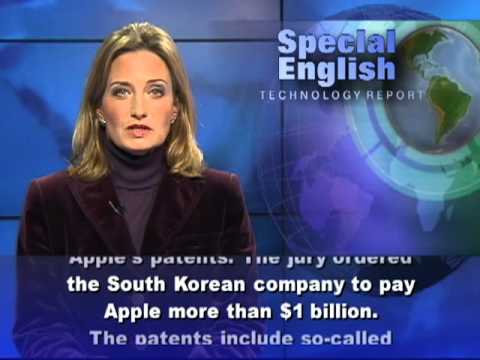This is the VOA Special English Technology Report, fromhttp://voaspecialenglish.com | http://facebook.com/voalearningenglish
Samsung Electronics won a case in its battle with the American technology company Apple over property rights. A court in Japan ruled in a case involving Samsung's Galaxy series of smartphones and tablet computers. A three-judge panel in Tokyo said the products did not violate an Apple patent for organizing music and video on several devices. The court also ordered Apple to pay all legal costs related to the case.A patent is a property right given by a government. It keeps others from making, using or selling an invention without the permission of the patent owner.But, the case in Japan is just one of many in the worldwide legal battle between Apple and Samsung. In August, a jury in California found Samsung guilty of willfully violating several of Apple's patents. The jury ordered the South Korean company to pay Apple more than $1 billion.The patents include so-called utility patents for Apple's "pinch to zoom" and "tap to zoom" technology. They let users change the way things appear on the screen of their device. Included are design patents on the look and shape of the iPhone. Madhavi Sunder is a law professor at the University of California, Davis. She has also written a book called "From Goods to a Good Life: Intellectual Property and Global Justice." She says issues involving design patents are complex. Madhavi Sunder says patents are meant to increase competition and support design and development. She sees a problem with Apple trying to say its designs are something only one company can have. She adds: "It raises the real question of whether or not we should be protecting designs with patents in the first place." Madhavi Sunder says Apple built its computer company using the same methods that it is now opposing. Apple appears to be saying that no one else can use its methods. Madhavi Sunder says, "This goes to the heart of what innovation is about."Samsung said the California court's decision, in its words, "should not be viewed as a win for Apple, but as a loss for American consumers." And the company told its employees that it would continue to fight until its arguments are accepted. But the dispute is far from over. On the day of the California ruling, a court in South Korea ruled that Apple and Samsung had violated each other's patents. For VOA Learning English, I'm Laurel Bowman. (Adapted from a radio program broadcast 03Sep2012)

원문출처 : http://www.youtube.com/watch?v=vpAKneCp3Y4&feature=youtube_gdata





 English
English 한국어
한국어
